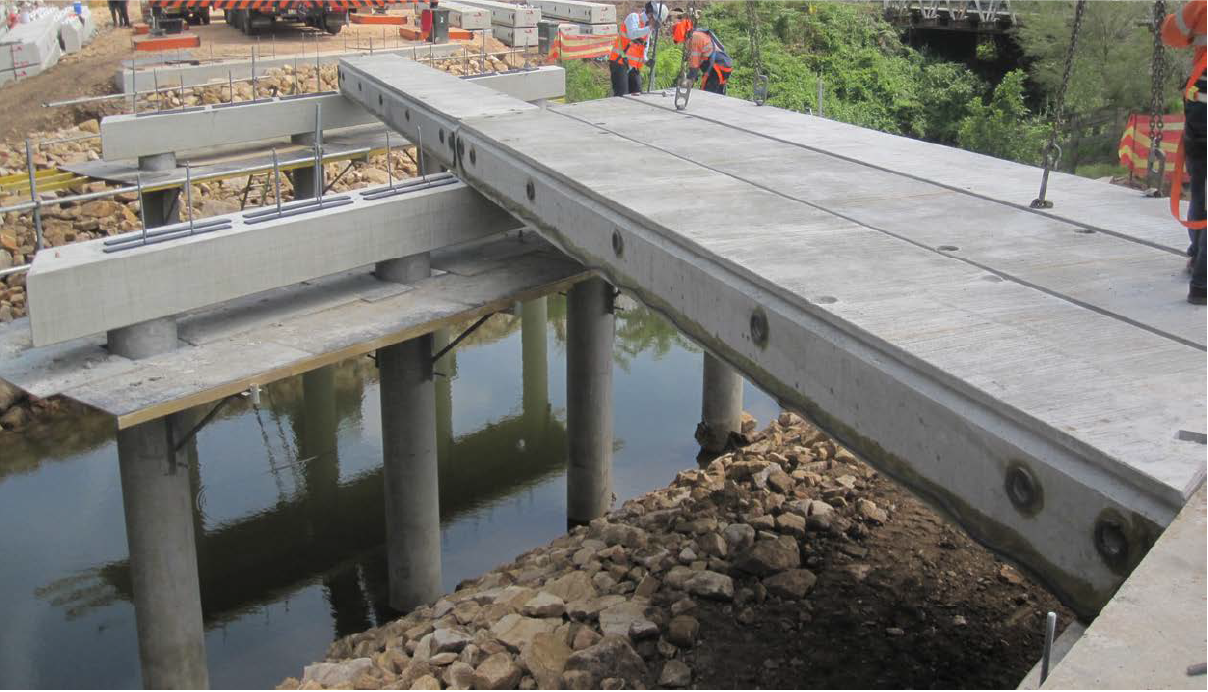When it comes to foundation piles, we are often asked questions like – what is a pile foundation and what are foundation piles? Where are these structures used, and are there different types of piles? What are the advantages of pile foundation structures and does a concrete pile foundation provide any particular benefits over other types of foundations?
In this post, we answer these questions and more. We explain the importance of a solid foundation in a construction project, consider the different types of foundation piles, and discuss the advantages of concrete foundation piles. So, read on to find the answers to all your questions about foundation piles, and pile foundations!
Note: ‘pile foundation’ refers to the entire foundation structure, including its foundation piles.
What Are Foundation Piles?
Foundation piles (piles or footings) are core structural components within the pile foundations used to support heavy structures such as bridges and buildings. Their role is to provide a solid foundation for the structure by transferring its weight, or load, from the ground surface (which may not suited for heavy weight bearing), to a deeper, more solid layer. This supplies the strength and structural stability needed to stop the structure above tilting, sinking, or cracking.
Strong pile foundations are particularly important in construction projects in areas where surface soils cannot support the weight of heavy aboveground structures.
What Is A Concrete Pile Foundation?
A concrete pile foundation consists of many individual concrete piles. If the piles are pre-cast they can be either driven into the ground (driven piles) or placed in pre-excavated holes (potted). Alternatively, in-situ piles can be cast into pre-drilled holes, typically using pre-fabricated reinforcement cages (bored or in-situ piles). Steel screwed piles are also an option.
Types Of Pile Foundations
Pile foundations typically consist of a series of foundation piles drilled, driven, or poured into holes in the ground. The choice of foundation pile used to create a pile foundation depends on:
- Soil type (mud, sand, rock),
- Soil condition (wet, dry),
- Type of structure (bridge, building, wall); and
- Load-bearing requirements.
There are several different types of piles, the most common of which are:
- Driven or Potted piles (pre-cast concrete)
- Bored / cast-in-situ piles
- Screw piles (steel); and
- Aggregate piles
Driven Piles
Driven piles are driven – hammered via driving rig – into the ground. They have traditionally often been timber, or steel, but today many projects use precast concrete piles, like the Duraspun® precast foundation pile.
One of the benefits of driven piles is the higher degree of soil strength along the length of the pile, created as the soil is pushed to the side where it forms a compacted zone around the pile. However, for this to work effectively, the soil must be able to drain quickly. Soils that retain water or drain slowly may not suit driven piles.
Drilled Or Bored Piles
Drilled or bored piles are can be either cased, or non-cased. In either method, a hole is drilled into the ground, lined with reinforcing materials, and backfilled with concrete. In a cased pile, the casing is left in the hole. In an uncased pile, the casing is pulled out as the concrete is poured.
Bored piles are ideal for situations where minimal soil settlement is desired as drilling does not compact or disturb the soil around the hole. They are often used to create pile foundations where vibrations created by hammering piles into the ground may be an issue.
Driven And Cast-in-situ Piles
A driven and cast in-situ pile is a good alternative to driven and bored piles as it combines the advantages of both. As the casing is driven into the ground, it provides the same soil compression benefits as a driven pile with the convenience of in-situ backfilling.
First, a steel casing (may be either permanent or temporary) is driven into the ground with the help of a mandrel inside the casing. The mandrel is then removed and the casing backfilled with concrete to create a concrete pile with a reinforcing steel shell.
Another type of driven and cast in-situ pile – the Franki pile or pressure-injected footing – has a compacted plug of dry cement in the base of a steel driving case. A drop hammer drives the casing into the ground by hammering the concrete plug, which pulls the casing with it.
At the desired depth, the casing is secured and the hammer drives the plug out the bottom of the casing where it expands to create a stabilising ‘mushroom-like bulb’ at the base of the pile. More concrete is added and driven out the bottom until a substantial anchoring bulb is formed. A tube of reinforcing steel is then dropped into the casing and backfilled with concrete, which is hammered and compacted as the casing is withdrawn.
Aggregate Piles
‘Aggregate’ refers to the compacted aggregate used to create the pile. As the hole is bored out, it is lined with casing. At the desired depth, the casing is backfilled with layers of aggregate. The aggregate is compacted as the casing is pulled out. This forces it sideways into the surrounding soil, compacting and strengthening the soil to improve its load-bearing capacity.
Advantages To Using Pre-cast Concrete
All types of foundation piles have their uses and suit particular situations. However, there are many advantages to using pre-cast concrete piles in construction, which is why they are the common choice for many foundation pile constructions in all types of soil types and environments. Here are some of the key reasons for considering a pre-cast concrete pile foundation for your construction project.
Compliance Guarantees
Importantly, pre-cast concrete piles are designed and manufactured to comply with specific standards and to meet precise load requirements. This may not always be possible to guarantee with in-site pours.
Our Duraspun® precast foundation pile for example is AS5100-2017 compliant and manufactured under our ISO 9001 quality management system. It is an ideal choice of foundation pile for a wide range of pre-cast driven or in-situ pile foundation applications. Notably, it is particularly suitable for supporting bridge piers; for use in applications like retaining walls and bridges; and for standalone use in single pile applications.
Strength And Stability – Enhanced Load-Bearing Capacity Of Concrete Pile Foundations
Reinforced pre-cast concrete provides strength and stability. Concrete pile foundations therefore have a much higher load-bearing capacity than those made from materials like wood. This makes them an ideal choice for particularly heavy structures, like large buildings and bridges.
Versatile And Adaptable – Flexibility In Design And Construction
Like most things made from pre-cast concrete, concrete foundation piles allow for design and construction flexibility so are a versatile and adaptable choice of pile for most types of pile foundations. They can be precast in various shapes and sizes to suit specific requirements and construction environments. This gives engineers plenty of options when it comes to selecting piles to suit specific soil conditions and load-bearing requirements.
Durability And Longevity – High Resistance To Corrosion, Decay, And Weathering
Concrete is the preferred choice of building material across a huge range of applications, including foundation piles, for good reason. When manufactured and cured correctly it is extremely durable, has a long life, and is highly resistant to corrosion, decay, and weathering. Precast products in particular are already cured so are not affected by wet soil conditions or adverse pH levels.
Precast concrete piles and pile foundations are particularly effective in conditions where:
- The structure will be subject to harsh weather conditions,
- The footings are located in water and waterlogged soils, or
- Will be subjected to vertical and horizontal loads.
Cost-Effectiveness – Efficient Use Of Materials And Resources
Although precast concrete products may be more expensive initially than some other options, they are usually a more cost effective long-term alternative to in-situ pours. Precast foundation piles for example can be ordered, made ahead of time, delivered as required and driven or inserted into the ground upon arrival. This removes the need to order the individual components, prepare, and install them in-situ.
As a result, the entire process is streamlined and cost-effective, which in turn reduces project time and labour, material, and equipment costs. In addition, because they have been manufactured and cured correctly in factory conditions prior to installation, they reduce the need for ongoing maintenance, or unscheduled replacement.
Low Environmental Impact – Reduced Environmental Impact Compared To Other Foundation Types
Foundation piles often end up sitting in water for at least part of the time. This means any chemicals or contaminants in or on the product can enter our natural water systems, and cause all manner of environmental problems. Wooden piles may have been waterproofed or termite treated for example, whilst steel rusts. Both scenarios have the potential to release contaminants into surrounding water, or soil.
Precast concrete on the other hand is environmentally safe, which is why concrete tanks are used to store water, and in stormwater management systems. Foundation piles made from precast concrete are therefore an obvious choice for reducing environmental impact.
Superior Consistency, Quality Control, And Quality Assurance
Precast concrete foundation piles provide superior consistency, quality control, and quality assurance. Because they are designed and produced in controlled factory conditions, they can be manufactured to extremely high standards in terms of uniformity, consistency, strength, and quality. They also undergo rigorous quality control before leaving the factory. This reduces the chances of defects in the product and ensures each pile complies with specified design standards and requirements.
Why Choose Civilmart for Your Foundation Piles?
Civilmart is one of Australia’s oldest and most trusted concrete solution providers with almost 800 years of combined experience and expertise across our various locations around the country. We have partnered with construction projects of all sizes and types, in all manner of environments and locations, providing expertise and reliable products manufactured to rigorously high industry standards. Our experience, industry-proven reliability, and superior concrete products make us the perfect choice of partner for your pile foundation construction. Contact us today and talk to our experienced professionals about all things related to concrete foundation piles.
Join the Civilmart family
Stay up to date with latest product releases, newest industry innovations and more!


